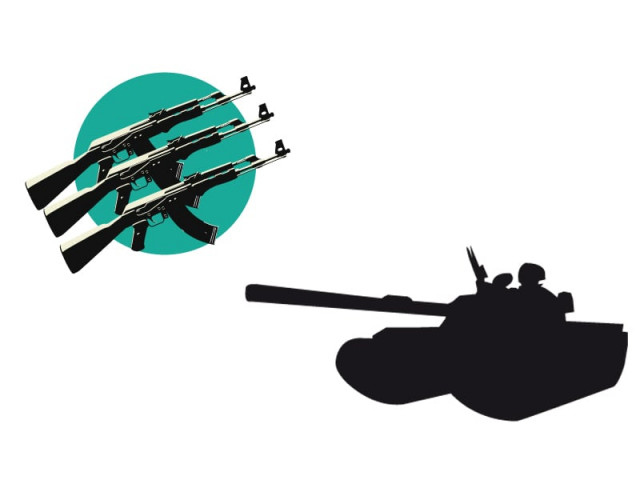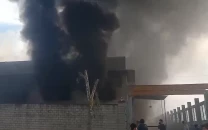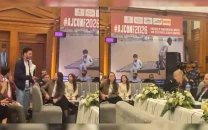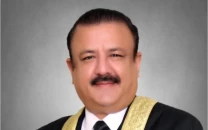Difa-e-Pakistan Part 1/2: Jihadis itch for resurgence
Religious leaders, some from banned outfits, join hands to ‘save Pakistan’.

Difa-e-Pakistan Part 1/2: Jihadis itch for resurgence
In December, Kashmiri hardliners, sectarianism-fanning extremists and Taliban-sympathisers were seen holding hands together on stage in Lahore under a banner decorated with images of arms, ammunition and a call for ‘Jihad’.
Since then, the Difa-e-Pakistan Council (Defence of Pakistan Council) movement has gained momentum across Pakistan and their leaders seem unperturbed by serious accusations against them. “Even if we were banned, we cannot just sit around and see this country go up in flames,” says Maulana Ahmed Ludhianvi, chief of banned religious group Sipah-e-Sahaba Pakistan (SSP), which now operates under a changed name, Ahl-e-Sunnat-Wal-Jamaat (ASWJ).
His group is not alone in urging Pakistanis to rise up. Under the auspices of Maulana Samiul Haq, chairman of Difa-e-Pakistan, over 40 different religious leaders, including those from ASWJ and Jamatud Dawa (JuD), held a meeting on October 12 last year in Lahore.
After this, Difa-e-Pakistan issued a statement saying that the President House is a hostage to the Americans, and appealed to the Supreme Court of Pakistan to force Parliament to abide by article 245 of the Constitution, which states that the country’s military be called in to defend Pakistan.
Party leaders say their agenda is to free Pakistan from American and Indian aggression by putting pressure on the current government. The group also released a 10-point agenda. One of the points is a warning sent to all “anti-Islamic, secular, liberal hypocrites inside Pakistan.” They also announced complete support for those fighting in ‘Occupied Kashmir’ as well as the Taliban in Afghanistan.
Difa-e-Pakistan may be a new name, but its roots lie in the movement started by its current chairman in the wake of attacks on Afghanistan by Western forces.
“At that time our brothers needed our support against the American crusade, so we took a stand for them,” says Maulana Samiul Haq, the 75-year-old former member of the National Assembly. The group he made at the time was known as the Pak-Afghan Council (PAC) but later, this group joined politics by merging into an Islamic alliance known as Mutahidda Majlis-e-Amal, which formed the government in the Khyber-Pakhtunkhwa under the Musharraf regime.
Samiul Haq currently heads a religious political party, Jamiat Ulema-Islam-S (JUI-S), and also runs a madrassa in Akora Khattak, a religious seminary that was frequented by the Afghan Taliban before 2001, a claim he denies.
Besides him, other prominent members include Hafiz Saeed and Maulana Muhammad Ahmed Ludhianvi, both of whom have come under local and international scrutiny due to their perceived connections with terrorist activities.
Jamatwud Dawa, currently on the United Nations list of banned organisations, is accused of involvement in the Mumbai attacks in 2008 that killed at least 166 people. Its chief, Hafiz Saeed, changed the organisation’s name from Jamatud Dawa to Falaah-e-Insaaniyat, but after he was set free by courts due to lack of evidence, his organisation now operates under the JuD banner openly throughout Pakistan.
The group dates back to the early eighties and its spokesperson, Yahya Mujahid, was widely quoted in the press as the spokesperson for Lashkar-e-Taiba in the 1990s, which is a globally banned ‘jihadi’ organisation.
Then there is Lashkar-e-Jhangvi (LeJ), which, says an intelligence officer who does not wish to be named, was SSP’s militant wing before it broke away. Its head, Malik Ishaq, when released from prison last year, was received by the head of ASWJ, Ahmed Ludhianvi, who stated at that time that Ishaq will continue his struggle peacefully.
But the intelligence official does not believe this. “Different smaller groups linked with LeJ are still involved in sectarian violence across Pakistan,” he says. Ishaq who spent more than a decade in jail, after being accused of involvement in more than 70 killings, was present at the last gathering of Difa-e-Pakistan in Multan. Samiul Haq, though, acknowledges the implications of standing in the same row with those accused of international and local terrorism. “I will keep a check on them and make sure they don’t do anything wrong,” he states.
Published in The Express Tribune, February 11th, 2012.


















COMMENTS
Comments are moderated and generally will be posted if they are on-topic and not abusive.
For more information, please see our Comments FAQ